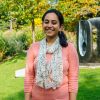
Gayatri Gulvady
- Course: MA Disability Studies
- Nationality: Indian
Please tell us a bit about yourself.
I am from Mumbai, India. In terms of my academic background, I have completed a B.A. in Psychology and a MSc. in Industrial Psychology from Indian universities. Prior to moving to Leeds, I was working with a Human Resource Consultancy where I assisted a diverse range of organisations build a happier workforce and a stronger work culture.
What motivated you to apply for your course at Leeds?
I chose to pursue Disability Studies for my second Masters as it’s an area that I am extremely passionate about. I also believe it’s an academic discipline that is extremely relevant in today’s times. For instance, in my home country (India), there is a lot that needs to done in order for disabled people to be treated with equality and dignity. However, for this change to happen, we need more professionals with specialist knowledge in this domain.
The key reason why I decided to apply to the University of Leeds was because of the reputation of its Centre for Disability Studies to effectively blend academics and advocacy. I wanted to be a part of a thriving learning environment where I could interact and learn from experts in this field.
What is it that makes you passionate about your area of study?
The urgency with which things need to change for the benefit of disabled people is what makes me passionate about this field. There are various simple and innovative ways by which society can become accessible for everybody. All it takes is an open mind and a desire to change the status quo.
What did you think of your course?
Overall, the course has been an incredible learning experience punctuated with moments of self-discovery. What I have enjoyed the most is attending classes led by professors who utilise their own cutting-edge research to inform their teaching practice. Another highlight has been to learn from my peers who come from different parts of the world. Listening to their experiences and views has enabled me to understand what disability means from various perspectives and within certain cultural contexts.
What do you think of the facilities?
The learning facilities in the School and at the University make it conducive for students to excel in their area of study. For instance, the three libraries on campus have an extensive collection of books that explore the different strands of Disability Studies. The University also provides access to a host of excellent journals for students to be up-to-date with relevant research in the field.
How do you find the student support in the School?
I find the student support in the School really approachable and informative. Be it requiring assistance to hone certain academic skills or seeking advice regarding one’s wellbeing, help is always available.
Have you been involved in any extra-curricular activities?
Under the Leeds University Union, there are a host of extra-curricular activities that students can participate in based on their areas of interest. Two activities that I am involved in, which have made my student experience at Leeds a holistic one, are Get Out Get Active and the Writing Back Project.
Get Out Get Active is a programme that organises lovely walks and hikes in the countryside. By signing up for their trips, I have been able to explore the Yorkshire Dales and make new friends who share a love for the outdoors. The Writing Back Project is a volunteer pen pal scheme that matches students of the University with older Yorkshire residents. By exchanging hand-written letters with 2 older residents, I have been able to learn about British culture from a different perspective.
What do you think about Leeds as a city?
As a city, I find Leeds really student-friendly, vibrant and diverse! The events that take place in the city cater to a wide variety of cultural backgrounds and hobbies. Be it public parks, playhouses, or cafés, there is a quite a bit in this city that is worth exploring. Lastly, with the stunning English countryside at its doorstep, its location makes it ideal for day trips and weekend getaways too.
What would you say to anyone thinking of applying to your course?
Firstly, do not hesitate to get in touch with the School for any queries that you may have about the course, as the staff members are always happy to help. Secondly, since this course has a strong research component, it might be helpful to read and think about which areas under Disability Studies you might want to explore during the course.
What are your plans for the future?
After finishing the course, I plan to get some work experience in the field. One of my areas of interest is to make leisure opportunities more accessible for all. I would like to create more awareness in our society by working on different ways in which disabling barriers can be tackled.
In the long-term, I see myself working in the area of policy-making and advocacy to harness the potential of partnerships between stakeholders such as the disabled people’s community, the government and NGOs.

